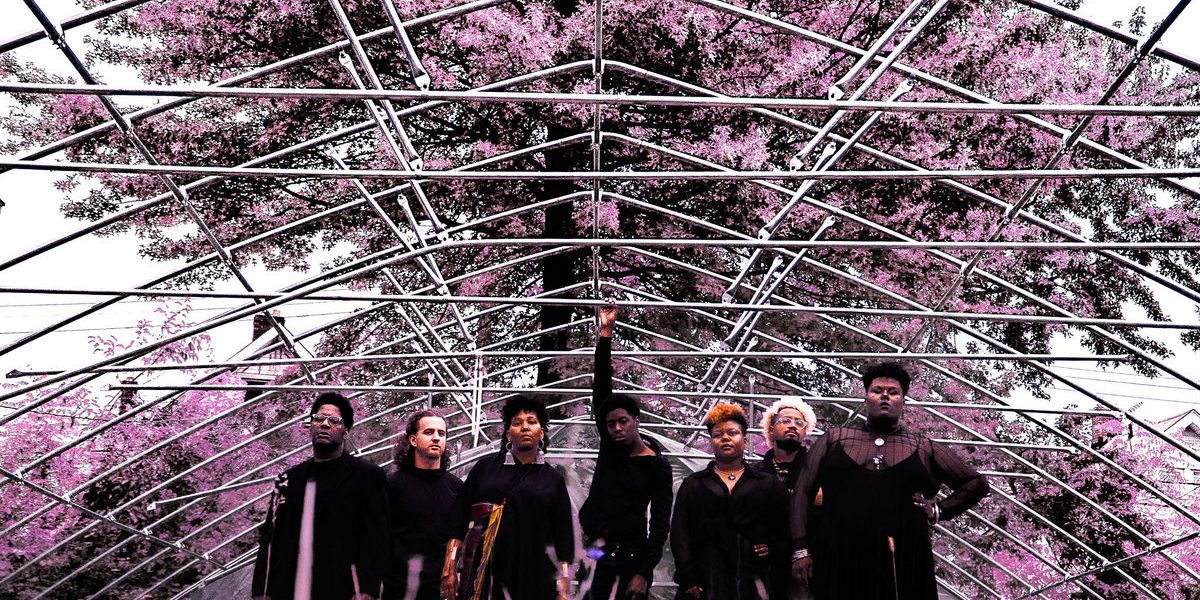The last few years have seen a resurgence of interest in reissues of deep, spiritual jazz recordings from late the 1960s and early 1970s, allowing many to hear forgotten gems such as Khan Jamal’s Creative Arts Ensemble, the World’s Experience Orchestra, or the gorgeous-beyond-words first LP from South Africa’s Batsumi. Alice Coltrane’s entire output has undergone a much-deserved re-appraisal as has the Impulse-era catalogue of spiritual jazz godfather Pharaoh Sanders. Alongside all of this has been the contemporary Afrofuturism of Nicole Mitchell, Hieroglyphic Being, and powerful examples of Black classical music’s forward push thanks to Matana Roberts, or the International Anthem label.
Irreversible Entanglements, an ensemble where free jazz anger meets the poetry of Camae Ayewa, aka Moor Mother, was co-released by International Anthem and Don Giovanni, a punk label out of New Jersey that has also released Moor Mother’s solo efforts as well as The Cycle, the latest from Mourning [A] BLKstar, an Ohio-based collective boasting three lead singers, horns, and insistent, portending grooves, They feel naturally connected to all of the above, while not sounding like any of them. In other words, there’s no way not to recognize this band’s roots; it’s also impossible to hear them as anything other than starkly original. And for anyone who’s kept up with them since their debut, the mood has gotten noticeably darker, something The Cycle makes clear. As it turns out, early versions of this LP’s songs were sketched out and played on stage even as they toured to promote last year’s The Reckoning.
Yet, this album’s spring 2020 release exposes music that can’t help but seem like a reaction to the current moment. It demands an end to systemic racism and its representative monuments, alongside the inequalities brought to center stage by COVID-19, render this country once and for all as a nation forced to finally take a look at the rotten stench of economic and racial apartheid. Part of The Cycle‘s in-the-moment feel also comes from the fact that this is largely a live-to-tape record, capturing the buzz and hum of their Cleveland, Ohio studio and using that undercurrent to fantastic, vibrating effect.
“The Wants”, with lyrics at once expressing bafflement at the economic predicament many are faced with and a determination to cut through it, rides a mid-tempo distorted pulse, horn lines sensuously responding to repeated vocal phrases. “Devil Get Behind Me” opens with an excerpt from the former chairman of the Black Panther Party’s Illinois chapter Fred Hampton, who keenly observes racism as necessary to capitalism. Once the song proper hits, with stuttered, dragged beats, all three singers harmonize over the line, “fear ain’t my name”.
Later, Cleveland Jazz Orchestra-affiliated Theresa May’s trumpet finds peace in her horn’s middle register. The horns on this record are consistently languorous, wafting over the album’s often slow tempos like cigar smoke in a dark basement bar. They cup Kyle Kidd’s soaring pleas on “So Young So”, and they punch vibrant, staccato holes through “Hard’s” density.
While The Cycle is a double LP of trudging rhythms and broken promises, it does offer tentative hope. That so much of this album is based on harmony, not only from the vocalists and horns, but on a fragile collective harmony we might not yet have extinguished as a nation, allows Mourning [A] BLKstar’s music to sound like salvation. Just check out Kidd’s performance on “Be”, as they sail over the following words: “So light up and grow, and remember everything that you know.” The Cycle is necessary, secular gospel for the healing of a truly damaged nation.


